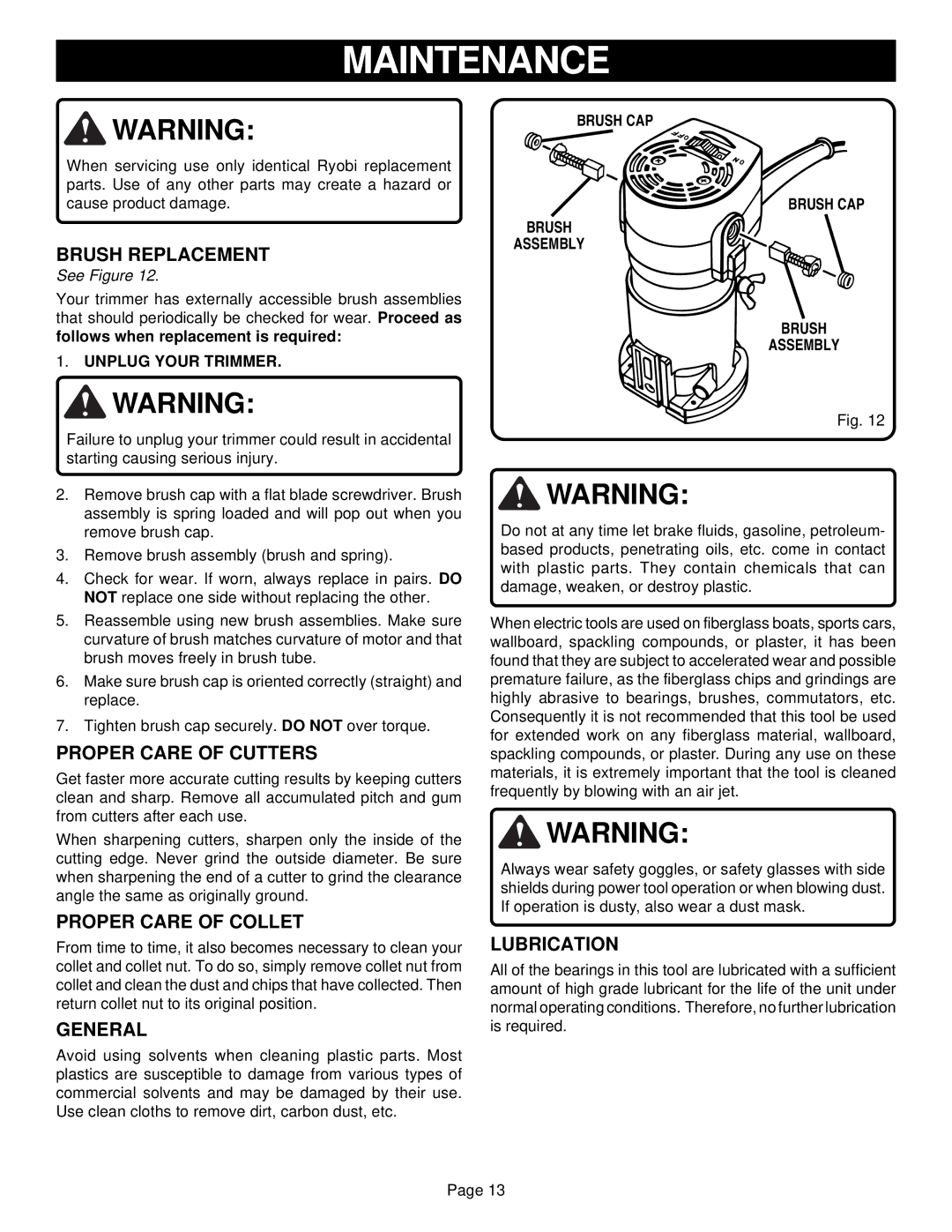
MAINTENANCE
![]() WARNING:
WARNING:
When servicing use only identical Ryobi replacement parts. Use of any other parts may create a hazard or cause product damage.
BRUSH REPLACEMENT
See Figure 12.
Your trimmer has externally accessible brush assemblies that should periodically be checked for wear. Proceed as follows when replacement is required:
1.UNPLUG YOUR TRIMMER.
![]() WARNING:
WARNING:
Failure to unplug your trimmer could result in accidental starting causing serious injury.
2.Remove brush cap with a flat blade screwdriver. Brush assembly is spring loaded and will pop out when you remove brush cap.
3.Remove brush assembly (brush and spring).
4.Check for wear. If worn, always replace in pairs. DO NOT replace one side without replacing the other.
5.Reassemble using new brush assemblies. Make sure curvature of brush matches curvature of motor and that brush moves freely in brush tube.
6.Make sure brush cap is oriented correctly (straight) and replace.
7.Tighten brush cap securely. DO NOT over torque.
PROPER CARE OF CUTTERS
Get faster more accurate cutting results by keeping cutters clean and sharp. Remove all accumulated pitch and gum from cutters after each use.
When sharpening cutters, sharpen only the inside of the cutting edge. Never grind the outside diameter. Be sure when sharpening the end of a cutter to grind the clearance angle the same as originally ground.
PROPER CARE OF COLLET
From time to time, it also becomes necessary to clean your collet and collet nut. To do so, simply remove collet nut from collet and clean the dust and chips that have collected. Then return collet nut to its original position.
GENERAL
Avoid using solvents when cleaning plastic parts. Most plastics are susceptible to damage from various types of commercial solvents and may be damaged by their use. Use clean cloths to remove dirt, carbon dust, etc.
BRUSH CAP
BRUSH CAP
BRUSH
ASSEMBLY
BRUSH
ASSEMBLY
Fig. 12
![]() WARNING:
WARNING:
Do not at any time let brake fluids, gasoline, petroleum- based products, penetrating oils, etc. come in contact with plastic parts. They contain chemicals that can damage, weaken, or destroy plastic.
When electric tools are used on fiberglass boats, sports cars, wallboard, spackling compounds, or plaster, it has been found that they are subject to accelerated wear and possible premature failure, as the fiberglass chips and grindings are highly abrasive to bearings, brushes, commutators, etc. Consequently it is not recommended that this tool be used for extended work on any fiberglass material, wallboard, spackling compounds, or plaster. During any use on these materials, it is extremely important that the tool is cleaned frequently by blowing with an air jet.
![]() WARNING:
WARNING:
Always wear safety goggles, or safety glasses with side shields during power tool operation or when blowing dust. If operation is dusty, also wear a dust mask.
LUBRICATION
All of the bearings in this tool are lubricated with a sufficient amount of high grade lubricant for the life of the unit under normal operating conditions. Therefore, no further lubrication is required.
Page 13
